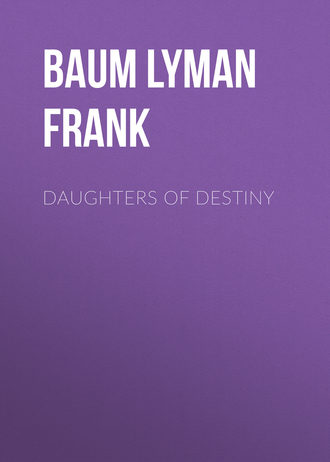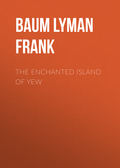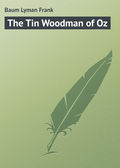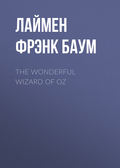
Лаймен Фрэнк Баум
Daughters of Destiny
CHAPTER III
THE PERSIAN PHYSICIAN
Burah Khan, known as the Lion of Mekran, Headsman of the Nine Tribes of Baluchi and Defender of the Faith, was, without doubt, a very sick man.
He lay upon a divan in the courtyard of his palace, propped with silken cushions redolent of the odors of musk. The waters of the fountain that splashed at his side were also scented with musk, and the heavy and stifling perfume permeated the entire atmosphere of the court. At the head of the divan sat a girl, indolently waving a fan above the head of the Khan. Not far from his feet a white-bearded man squatted upon a rug and eyed the sick one with curious intentness. This was Agahr, the vizier. Behind him sat a group of officers and sirdars, silently watching the scene.
Burah Khan, despite his sad condition, was fully clothed in his customary regalia. He wore a waistcoat of dingy white plush upon which were sewn enough rubies to have ransomed a kingdom. His yellow satin trousers were soiled and crumpled. The long outer robe was of faded rose-color and had nine stars, formed of clustered diamonds, down the front. The deep collar was stiff with masses of the same precious gems. The entire dress seemed as tawdry as a circus costume at the end of the season; but it was of enormous value, and the Khan, with oriental love of magnificence, clung to it even as he lay upon his death-bed.
He was a notable character, this Burah Khan, son of the terrible Keedar Khan who had conquered all of Baluchistan and ruled it with a rod of iron. Burah had inherited with the throne the fierce hatred with which his father was ever regarded; yet he had not only held every province secure, but had won the respect and fear of all his people. The thirty years of his rule had not been void of wars and bloodshed, yet at the head of his nine Baluch tribes the Khan had swept aside all opposition and won for himself the title of “The Lion of Mekran,” Mekran being his dwelling-place when not in the saddle.
Today, gaunt and haggard, he lay gasping upon his divan. His fingers opened and closed convulsively in the meshes of his iron-gray beard; his drooping eyelids were sunk in deep sockets. The pallor of death showed through his swarthy skin. To Agahr and the silent group behind him it seemed that the Khan was conquered at last.
The sick one moved restlessly and raised his hand.
“Has – has – he come?” he asked, speaking the words with much difficulty.
Agahr leaned forward, without rising, and answered his master with composure:
“Not yet, lord.”
It was a question often repeated and as often answered with the same words.
A moan came from the Khan. The vizier noted the patient’s restlessness and made a sign with his hand. At once the curtains of the rear entrance were swept aside and a troop of girls entered. They were robed in white; vines of the mountain iral were twined in their hair; in their hands were bellalas. The girls danced. A tall Arab with immense hoops of gold in his ears beat a tambo to mark the time, and the bellalas chimed a tinkling chorus.
The eyes of the Khan never opened, but he made an impatient gesture and moaned again. The intent Agahr noted this and at his command the noise of the tambo ceased and the girls withdrew. Evidently the Khan could no longer be amused in this fashion.
For a brief space of time the courtyard again became silent. Then, so suddenly that a thrill crept over the watchers, a tall imposing figure glided to the side of the divan and cast a shadow over the face of the sick man.
Burah Khan moved, opened his eyes and fixed his gaze eagerly upon the new arrival. The vizier arose quickly and approached the couch, bowing low and looking into the calm countenance of the stranger with undisguised anxiety. The group of minor officials also looked their interest, and the girl forgot to wave her fan while she examined the person of the man so long awaited.
“The great physician is here, my master,” whispered the vizier. But Burah Khan did not heed him. An expression of relief had come to his pinched features, and his eyes were fixed earnestly upon the face bent above him, as if he would read his fate in the countenance of the famous Persian who had been brought all the way from Kelat to minister to his imperative needs.
The physician raised the sick man’s eyelids and glanced beneath them. He placed his right hand under the Khan’s head and at the same time pressed an ear to his chest. It seemed enough. He stood erect, with folded arms, bending a searching yet kindly gaze upon the face upturned to his.
“Tell me!” pleaded the Khan, feebly.
The Persian gave a quick glance around. Then he answered:
“They listen.”
“Let them hear,” said the Khan, raising himself with an effort upon his elbow. “They – are all – friends.”
A queer look came over the stranger’s face. But he said, in a calm voice:
“The sickness is fatal. You will die.”
For a moment the Lion of Mekran returned the other’s gaze steadily. Then he lay back upon his pillows and sighed.
Agahr, who eyed his master as if fascinated, heaved an echoing sigh, and the group of officials exchanged looks of consternation.
“When?” asked the Khan, his voice now strong and clear, his eyes on the impassive face before him.
“A day – an hour,” replied the Persian, slowly. “It is Death’s secret.”
For a few moments the silence was unbroken save for the splash of the fountain as its perfumed spray fell into the marble basin. Then the Khan again aroused himself.
“Can you hold Death at bay – for a time?” he asked.
“How long?”
“Speak, Agahr!” turning to his vizier. “How long to get my son here – to assemble the Sirdars of the Nine Tribes?”
Agahr was trembling visibly. He clasped and unclasped his thin hands nervously and glanced first at his master and then at the physician.
“Speak!” said the latter, sternly.
“To the monastery of Takkatu is three days’ journey – three days, at least,” he said, hesitatingly. “And for Prince Ahmed to return will require three more. Seven days – a week – with fast riding.”
“Then,” said the Khan, calmly, “they must ride fast.” He turned to the Persian. “Can you fight Death so long?”
The Persian nodded. The pluck of Burah Khan aroused his admiration.
“I will fight Death so long,” said he, gravely.
“And the sirdars?” asked the sick man, once more turning to his vizier.
“They can be assembled in five days,” answered Agahr, after a moment’s reflection. “Three are already here.”
“Good!” declared the Khan. “Let Dirrag ride within the hour.”
“For the sirdars?”
“For Ahmed.”
He fell back again, and a man rose from the group behind Agahr and with an obeisance toward the divan glided swiftly from the courtyard.
The physician, noting the action, turned to the vizier.
“Dirrag?” he enquired.
“Dirrag,” responded the other, mechanically.
The Persian gave his patient a sharp scrutiny, and drawing a phial from his bosom placed it to the now colorless lips of the Khan.
“Clear the place,” he commanded Agahr, and without awaiting a response himself stepped quickly through the outer arch.
Outside Dirrag was mounting a strong Arabian mare. The Persian arrested him with a gesture.
“The Prince must be here in six days,” he said, in a low but commanding voice. “Six days, or – ”
“I understand,” said Dirrag, and put spurs to the mare.
CHAPTER IV
THE DAUGHTER OF THE VIZIER
Upon a stone gallery overlooking the courtyard of a handsome dwelling not far from the palace of the khan reclined a girl, beautiful with that mysterious Eastern beauty that has been for ages the despair of poets and artists and which attains its full charm only in the Orient. She was scarcely seventeen years of age, yet her rounded outlines, her graceful poise, her sedate demeanor, all proclaimed her a maiden on the verge of womanhood. Her eyes, round and soft as those of a fawn, were absolutely inscrutable; her features in repose held the immutable expression of the Sphynx. When she smiled sunbeams danced in her eyes and a girlish dimple showed in her chin. But she rarely smiled. The composed, serious, languorous expression dominated her exquisite face.
The girl was richly dressed. Her silken gown was of finest texture; pearls of rare size were twined in her dark hair; a golden serpent whose every scale was a lustrous diamond spanned her waist; upon her breast glittered a solitary blood-red ruby of historic fame, known in song and story for generations.
For this maiden was Maie, only daughter of Agahr, Grand Vizier to the Lion of Mekran and to his father before him – the terrible Keedar Khan.
Next to Burah himself in rank, virtually directing all the civic affairs of the nation, responsible to none save his stern master, Agahr was indeed a personage of vast importance in the realm. The sirdars of the nine fighting tribes of Baluchi, the main support of the Khan, might look upon the vizier scornfully; but they obeyed his laws and avoided any interference with his civic functions.
Maie was the daughter of Agahr’s old age, his only companion and his constant delight. To her he confided many of the problems that from time to time confronted him, and often a quiet word from the girl’s lips showed him the matter in a new light and guided him in his actions. The old man had discovered a store of common sense in the dainty head of his daughter; the inscrutable velvet eyes were wells of wisdom from which he drew solace and counsel in all difficulties.
On the evening of this eventful day came Agahr to the gallery where his daughter reclined. And as he sat beside her she turned her eyes upon his face and seemed to read it clearly.
“The Khan is worse,” said she, quietly.
“He is dying,” answered the vizier. “The Persian physician has come from Kelat, and he says there is no hope.”
“We shall be making history soon,” remarked the girl, in soft tones. “The Khan will pass away, and Kasam is here.”
The vizier moved uneasily on his seat.
“Kasam is here; yes,” said he. “But no one knows the secret save us. No one knows who our Kasam is.”
“They will know soon,” returned the girl in a calm, expressionless voice. “Our cousin Kasam is rightful heir to the throne – when the Lion’s eyes are closed in death.”
“You forget that Burah Khan has also a son,” said the old man, harshly. “Even now Dirrag is riding full speed to the Sunnite monastery at Takkatu to bring hither the Prince Ahmed.”
“That he may be acknowledged successor to the throne by the assembled sirdars of the Nine Tribes?”
“Yes.”
“But the Khan is dying. The Prince cannot arrive in time.”
“Perhaps not. Yet that accursed Persian has promised to prolong the Khan’s life for seven days. If he succeeds – ”
The girl bent forward suddenly.
“He must not succeed!” she exclaimed, in a clear voice.
Agahr shrank from the intentness of her gaze.
“Hear me!” she continued. “Kasam is our kinsman; the throne is his by right. Most of our citizens and many of the members of the Nine Tribes secretly favor his claim. A crisis approaches, and we must take advantage of it. The Lion of Mekran must not live seven days. If his son Ahmed, who has been secluded for twenty years in a monastery, and is said to be devoted to Allah, is not here to be recognized as the successor to the throne, the people will acclaim Kasam their khan. It is all very simple, my father. The Lion of Mekran must not live seven days!”
“What, plotting again, cousin?” cried a cheery voice behind them. Agahr gave a sudden start and wheeled around with a frown, meeting the smiling face of Prince Kasam, but the girl moved not even an eyelid.
“Pardon me, uncle, for startling you,” said the young man, coming forward and taking a seat beside the vizier. “I arrived in time to hear cousin Maie doom Burah Kahn to an early death, as if the dark angel fought on our side. What a wonderful little conspirator you are, my Maie!”
She looked into his face thoughtfully not caring to acknowledge the compliment of his words or the ardor of his gaze. But Agahr said, gruffly:
“The conspiracies of women cost many men their heads.”
“Very true, uncle,” replied Kasam, becoming grave. “But we are in sore straights, and a little plotting may not come amiss. If the son of the old Lion – who, by the way, is also my cousin – is acknowledged by the sirdars, he is liable to make a change in his officers. We may lose our vizier, and with the office more than half our power with the people. In that event I can never become kahn.”
“The son of Burah must be a weakling and a dreamer,” said the girl, thoughtfully. “What can be expected of one who for twenty years has associated with monks and priests?”
“Twenty years?” exclaimed Kasam; “then my cousin Ahmed must be nearly thirty years of age.”
“And a recluse,” added Maie, quietly. “You, Prince, are not yet twenty-five, and you have lived in the world. We need not, I am sure, fear the gentle son of Burah – even though he be acknowledged by his father and the sirdars of the tribes.”
“Which will surely happen if the Khan lives seven days. Is it not so? But if Allah calls him sooner, and my friends are loyal – why, then, I may become khan myself, and much trouble spared. The English have an injunction to ‘strike while the iron is hot.’ We may safely apply it to ourselves.”
Maie glanced at her father, and there was a glint of triumph in the dark eyes.
“It is what I have said,” she murmured. “The Lion of Mekran must not live seven days.”
“Do you know, fair one,” remarked Kasam, lightly, “that only yesterday I bewailed the approaching fate of the usurper, and longed to have him live until we could secure England’s support?”
“England!” she cried, scornfully. “What is that far-away nation to our Baluchistan? It is here that history will be made.”
Kasam laughed merrily.
“What a logical little head you have, cousin!” he answered, laying his hand upon her own, caressingly. “To us, indeed, Baluchistan is the world. And England’s help is far away from us in this crisis. Tell me, Maie, what is your counsel?”
“It is your duty, Prince, to prevent Burah Khan from living until his son arrives to be acknowledged his successor.”
Kasam’s face became suddenly grave.
“My duty, cousin?” he replied. “It is no man’s duty to murder, even to become khan. But perhaps I misunderstood your words. I am practically a stranger in my own land, and can do little to further my own interests, which naturally include the interests of my friends. If Burah Khan fails to live until his son’s arrival it will be through the will of Allah, and by no act of mine.”
“You are a coward,” said the girl, scornfully.
“Yes,” he answered, coldly; “I am afraid to become a murderer.”
“Peace, both of you!” commanded the vizier, angrily. “You are like a pair of children. Do you think that I, who have been Burah’s faithful officer for thirty years, would countenance treachery or foul play while he lies upon his death-bed? I long to see Prince Kasam seated upon the throne, but it must be through honest diplomacy, and by no assassin’s stroke.”
“Right, my uncle!” cried Kasam, seizing the vizier’s hand in a hearty clasp. “Otherwise, were I khan, you should be no officer of mine.”
Agahr and his daughter exchanged a quick glance, and the girl said, languidly:
“I was doubtless wrong, urged on by the intensity of my feeling and my loyalty to the Tribe of Raab. But a woman’s way is, I think, more direct and effective than a man’s.”
“Even if less honest, cousin?” retorted the young man, playfully pinching her cheek. “Let us bide our time and trust to the will of Allah. This evening I must set out on my return to Quanam. What answer shall I take to my foreign friends who await me?”
“Tell me, Kasam; why do they wish to cross our territory – to visit our villages and spy upon our people?” asked Agahr suspiciously.
“It is as I told you, my uncle. They are people of great wealth, from the far western country of America, and it is their custom to penetrate to every part of the world and lay rails of iron over which chariots may swiftly speed. We have no such rails in Baluchistan.”
“Nor do we desire them,” returned the vizier, brusquely.
“But they would bring to us all the merchandise of that wonderful western world. They would bring us wealth in exchange for our own products,” said Kasam, eagerly.
“And they would bring hundreds of infidels to trick and rob us. I know of these railways,” declared the vizier.
“I also,” answered Kasam, lightly. “I have been educated in Europe, and know well the benefits of western civilization.”
“But the Baluchi do not. Our own high and advanced civilization is enough for us.”
The young man smiled.
“It is not worth an argument now,” he remarked. “The present mission of this party of infidels is to examine our country and consider whether a railway across it would be profitable. All that I now require is a passport and safe conduct for them. It will benefit our cause, as well, for only as the guide to these foreigners dared I return to my native land. If I am permitted to depart tonight with the passport I can easily return in time for the crisis that approaches. Then perhaps our American friends will be of service to us, for no one will suspect their guide of being the exiled heir to the throne.”
The vizier hesitated.
“But the railway – ”
“Bother the railway!” interrupted Kasam, impatiently. “That is a matter of the future, a matter for the new khan and his vizier to decide upon, whoever they may chance to be.”
“Here is the passport,” said Agahr, reluctantly drawing a parchment from his breast. “Burah Khan was too sick to be bothered with the request of the infidels, so I made out the paper and signed it by virtue of my office.”
“Ah, and affixed the great seal, I perceive,” added Kasam, taking the document. “I thank you, uncle Agahr. We shall get along famously together – when I am khan.”
He bade them adieu the next moment, embracing the vizier and kissing his cousin’s hand with a gallantry that brought a slight flush to the girl’s cheeks. And soon they heard the quick beat of his horse’s hoofs as he rode away.
Maie and her father looked into each other’s eyes. Presently the old man spoke, slowly and thoughtfully.
“You will share his throne, my child.”
The girl nodded and fanned herself.
“The life in Europe has made Kasam foolish,” said she. Then, leaning forward and regarding the vizier earnestly, she added in a whisper:
“Nevertheless, Burah Khan must not live seven days!”
CHAPTER V
THE PERIL OF BURAH KHAN
Three days had passed. The khan remained sunk in a stupor caused by the medicines administered by the Persian physician, who hovered constantly around the bedside of his patient. Burah now lay in a well aired, high vaulted chamber. The musk-scented cushions had been ostracised, the dancing girls dismissed. Quiet reigned throughout the vast palace.
Occasionally Agahr would thrust his head through the curtains draping the entrance, as if seeking to know that all was well; but the Persian merely gave him a reassuring nod and motioned him away.
This summary banishment did not please the vizier. His daughter had assisted him in forming several plans of great political import, and the conduct of the foreign physician prevented their being carried to a successful issue.
Thus Agahr, appearing again at the entrance, beckoned with imperative gesture the Persian to join him; and, after a careful inspection of his patient, lying peaceful and unconscious, the physician obeyed.
Together they paced up and down the deserted marble passage, the Persian’s quick eye never leaving the entrance to the khan’s chamber, while Agahr plied him with eager questions concerning his master’s condition.
“He will live until his son, the Prince Ahmed, arrives,” said the other, calmly. “He will remain unconscious, but he will live.”
“And then?” asked the vizier, anxiously.
“Then I will awaken him. He will have full command of all his faculties for a brief period – and then he will pass away quickly.”
Agahr sighed.
“Is it not possible for him to pass away during this stupor?” he enquired.
“Yes, it is possible,” answered the Persian. “But I believe I can prevent that. My task requires constant vigilance: that is why I dare not leave the Khan’s chamber.”
“I will send a man to relieve you,” said the vizier. “You can instruct him in his duties and he will be faithful.”
“No,” returned the Persian.
An awkward silence followed. Then Agahr stopped suddenly and said:
“I will be frank with you. The son of Burah Khan is not the rightful heir to the throne of Mekran. It is the exiled Prince Kasam, from whose grandsire Keedar Khan by right of sword wrested all Baluchistan. Therefore it is best for the country that Burah does not live until his son arrives.”
He paused, wiping the perspiration from his brow and glancing half fearfully into the grave face of the physician. The latter nodded.
“I understand,” said he.
Agahr became reassured.
“The ancestors of Prince Kasam,” he continued, earnestly, “ruled the land for nine generations. Then the Baluchi rebelled and put their Headsman, the fierce Keedar Khan, upon the throne his own brother was forced to vacate. I being at the time vizier, remained Keedar’s vizier, as I have remained vizier to his son. By means of wars and bloodshed these terrible men have for forty-six years dominated all Baluchistan. It is now time, in the interest of justice and humanity, that the rightful heir should recover the throne.”
“Did not Prince Kasam’s ancestors conquer this country with the aid of the Afghans, and put to death every member of the then reigning family?” asked the Persian.
“It is a matter of history,” said Agahr, proudly. “They were my ancestors, these bold conquerors, as well as the ancestors of Prince Kasam.”
“Yet Keedar Khan made you his vizier, and his son retained you?”
“Yes; and I have been faithful.”
“But now, it seems to me, you are speaking treason,” said the physician.
“Not so,” declared the vizier, indignantly. “Burah Khan, by your own showing, is virtually dead at this moment. I owe no allegiance to his son, whom I have never seen.”
“How is that?” asked the physician, in surprise.
“When Ahmed was a child his father, fearing a revolt and that his boy might fall by an assassin’s knife, placed him in the Sunnite monastery at Takkatu for safe keeping. There he has remained ever since. It will be necessary for Burah Khan to officially acknowledge him before the chiefs of the Nine Tribes and to appoint him his own successor, before Ahmed can legally occupy the throne. If this is not done the people, who are weary of the rule of these tyrants, will acclaim Kasam as khan.”
“But Prince Ahmed will arrive, and be acknowledged. Burah Khan has so willed it, and he is still the master.”
Agahr faced the Persian with an angry frown.
“Do you refuse to assist us?” he asked, sharply.
“I refuse to betray the man whose life I have promised to preserve until his son arrives,” declared the physician.
“But you are a stranger – a Persian.”
“Even so.”
“And you expect a reward, or you would not have hastened to Mekran when summoned by the Khan. Name your price. I will double it, and you shall depart this very night.”
The Persian smiled.
“Here, and throughout the world,” said he, “the strongest argument is the clink of gold. Listen well, your Excellency. I have promised Burah Khan life for seven days. I shall keep my promise. Then, if the Prince does not come, I can do no more.”
The vizier started.
“If the Prince does not come?” he repeated, thoughtfully.
“To be sure.”
“Ah! I had not thought of that!” exclaimed the old man.
“It is the only thing I fear,” said the other, with exasperating coolness; “but I rely upon Dirrag. If you are able to delay him you will doubtless win the throne for Prince Kasam.”
Before the mocking tones had died away the physician disappeared behind the draperies of the khan’s chamber, and the vizier, controlling his anger and chagrin as best he might, walked away to concoct further plans.
The woman who brought the Persian his evening meal became confused under his sharp scrutiny and started to retire hurriedly. He arrested her with a stern command, saying:
“Sit here and taste of the dish you have brought.”
Then she began to tremble.
“Master, I dare not!” she wailed.
“Very well. Take away this food and bring me eggs boiled in the shell.”
The physician was bending over the couch of the khan when one of the under cooks entered silently with the eggs. The man was of the Brahoe caste, small and wiry. He placed the eggs upon the table and eyed for a time the back of the tall Persian, who seemed intent upon his patient. But a moment later he suddenly straightened, threw back his hand and caught the wrist of the Brahoe in a firm grasp.
A dagger fell upon the rug, and the man shrank back shuddering before the gleaming eyes of the physician.
An instant they remained motionless. Then, releasing his prisoner, the physician picked up the dagger, placed it within his own bosom and seated himself quietly at the table. One of the eggs he cast aside; there was a tiny pin-hole through the shell. The others he ate with his usual composure. As he raised a cup of water to his lips the Brahoe, who had watched him with amazement, suddenly stretched out his hand in warning.
“Wait! it is poisoned,” he whispered. “I will bring you more.”
Swiftly he glided away and presently returned with a fresh bowl of clear water.
The physician drank without hesitation.
“You may go,” said he, setting down the bowl.
“Master,” said the man, “be warned. You are surrounded by dangers. But you are brave, and I am your servant henceforth. Eat hereafter only the food I bring you.”
The Persian nodded and gave the Brahoe a smile. Still the man hesitated, peering cautiously about as if suspecting listeners. Finally he came nearer and said in a low voice:
“I do not know all; your foes are cunning and powerful. But the old khan is not to live the seven days. And life is lightly esteemed in Mekran – if it stands in the way of a purpose. Do not sleep tonight.”
“I never sleep,” returned the Persian, looking upon the man curiously.
Indeed, the critical condition of Burah Khan seemed to require his constant attention. The strange physician watched the silent form carefully throughout the night, and only once noted a slight movement of the draperies that guarded the entrance to the chamber.
At daybreak he drew the curtains of the windows to let in the light, and turned about in time to dash his heel upon the head of a small but venomous serpent that was poised to strike him with its fangs. Some one had placed it in the room during the night – a messenger of death to either the Khan or his physician, it mattered little which.
The Persian stared at the writhing snake a moment and made a gesture of impatience.
“It is only the fourth day,” he muttered. “I wonder where Dirrag is.”
An hour later the woman brought in his breakfast.
“Where is the Brahoe?” he demanded, sharply.
“He was found dead this morning,” said the woman, shuddering. “Some enemy, it seems, strangled him while he slept.”
The frown upon the Persian’s brow was so fierce that the woman slipped away in terror.
“It is only the fourth day,” he growled again, between set teeth; “but the Khan shall live until the seventh day – unless Dirrag comes before. I have sworn it, and, by Allah, I will keep my oath!”






